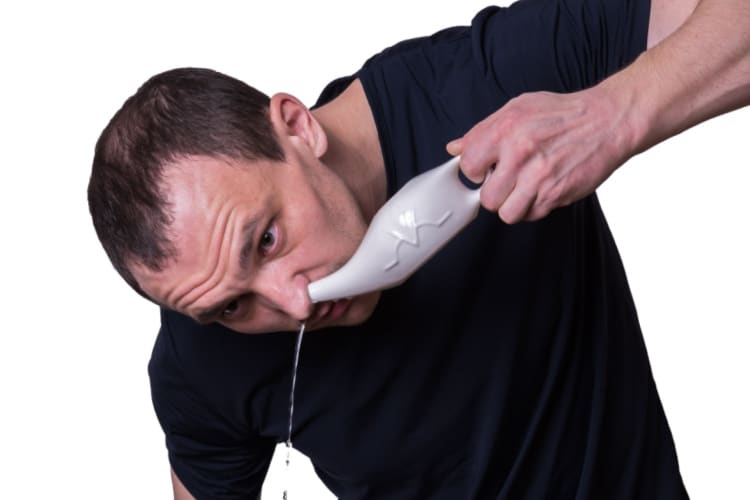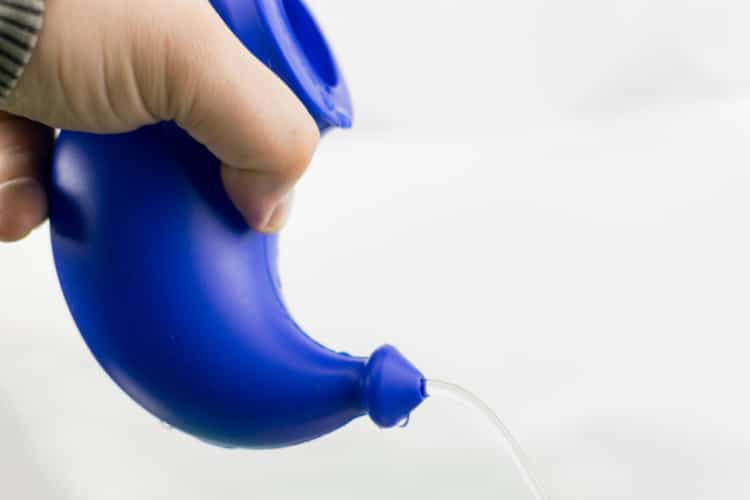Reverse osmosis is a water purification process that eliminates contaminants in water, making it an excellent choice for neti pot usage.
In this article, we will answer all your questions concerning using reverse osmosis water in Neti Pots.
Are Neti Pots Safe?
Neti pot cleansing is an ancient method that has been commonly used to provide relief for individuals suffering from nasal allergies and congestion for centuries.

They are known to alleviate the symptoms of common cold. They can also lead to an improved quality of life for people with chronic sinus infections.
In some cases, they can lead to temporary seasonal allergy retractions as well as combating sinus ailment symptoms.
That said, frequent neti pot usage can interfere with the body’s production of protective nasal mucus and cause issues with dry nasal passages.
Safe Neti Pot Water
As expected, the water source used in neti pot has significant impact on the outcome. Reverse Osmosis, Spring or Distilled water is the safest to use for neti pots.

For the vast majority of the American population, the tap water delivered to our homes from the municipal water source is perfectly fine for cooking and bathing.
However, using tap water in a neti pot can be dangerous. Tap water may contain minute levels of protozoa, amoeba, and other infectious contaminants. The human digestive system is equipped to neutralize these contaminants, but you’ll expose yourself to illness if you keep running those contaminants past your sinuses on a day-to-day basis. The upper respiratory system provides a warm, moist environment for these organisms to thrive.
If tap water is all you have at your disposal for your neti pot routine, then we suggest boiling and leaving it to cool before using.
How RO Purifies Water For Neti Pots
Before we dive into reverse osmosis, let’s first define its counterpart: osmosis. In regard to water filtration, osmosis is a passive process that works by pushing water or solvents through a membrane that filters the dissolved solutes.
How Does Osmosis Work?
For the sake of simplicity, let’s say that sugar is our solute and water is our solvent. When combined, we get sugar water. By employing a U-tube and placing it in the middle of the tube we are going to segregate the sugar water on one side, and pure water on the other.
If everything works as it should, the levels of the sugar water side should start to rise because water will push for equilibrium.
In short, a solvent of low concentrated solute moves through the filtration membrane to reach the highly concentrated solution. When this takes place, the concentrated solution dilutes.
That’s osmosis in a nutshell.
So, What About Reverse Osmosis?
However, reverse osmosis systems, like those used for removing contaminants such as chlorine, salt, and dirt from water, are a bit more complex and require an energy source in order to do their job.
Osmosis is a one-directional process, but reverse osmosis is when the whole process of osmosis changes direction and the water passes through a semipermeable membrane driven by pressure. This makes the process continuous and keeps going until the water is cleansed of contaminants and debris.
Ultimately, reverse osmosis is a filtration process that removes up to 99% of water contaminants. If we place resin in the water, the process of osmosis will cause them to swell and thus purify the water moving through them.
Neti Pot Care
After every use, thoroughly clean your neti pot with hot sterile water and antibacterial soap. If you’ve left your pot in an unsanitary place or if it’s otherwise tarnished, fill it with a weak bleach solution and allow it to sit for thirty minutes before rinsing with sterile water.
In Closing…
Reverse osmosis water is safe to use in neti pots. It is a good alternative to using boiled, distilled or spring water for neti pots.
Are reverse osmosis water filters good/safe to use for nasal irrigation? If so, do I need to boil the water before irrigating my nose?
Hi Hector, thanks for reading and for your question. Yes, you may boil untreated tap water for this use and that is recommended because of the potential health risk. (See FDA reference here). Yes, RO water is a good choice for nasal irrigation as the RO process is highly effective in removing organisms such as bacteria, protozoa, and viruses. (See CDC reference here) If you are treating your water with an RO system, there will not be a need to boil the water for use in your neti pot.